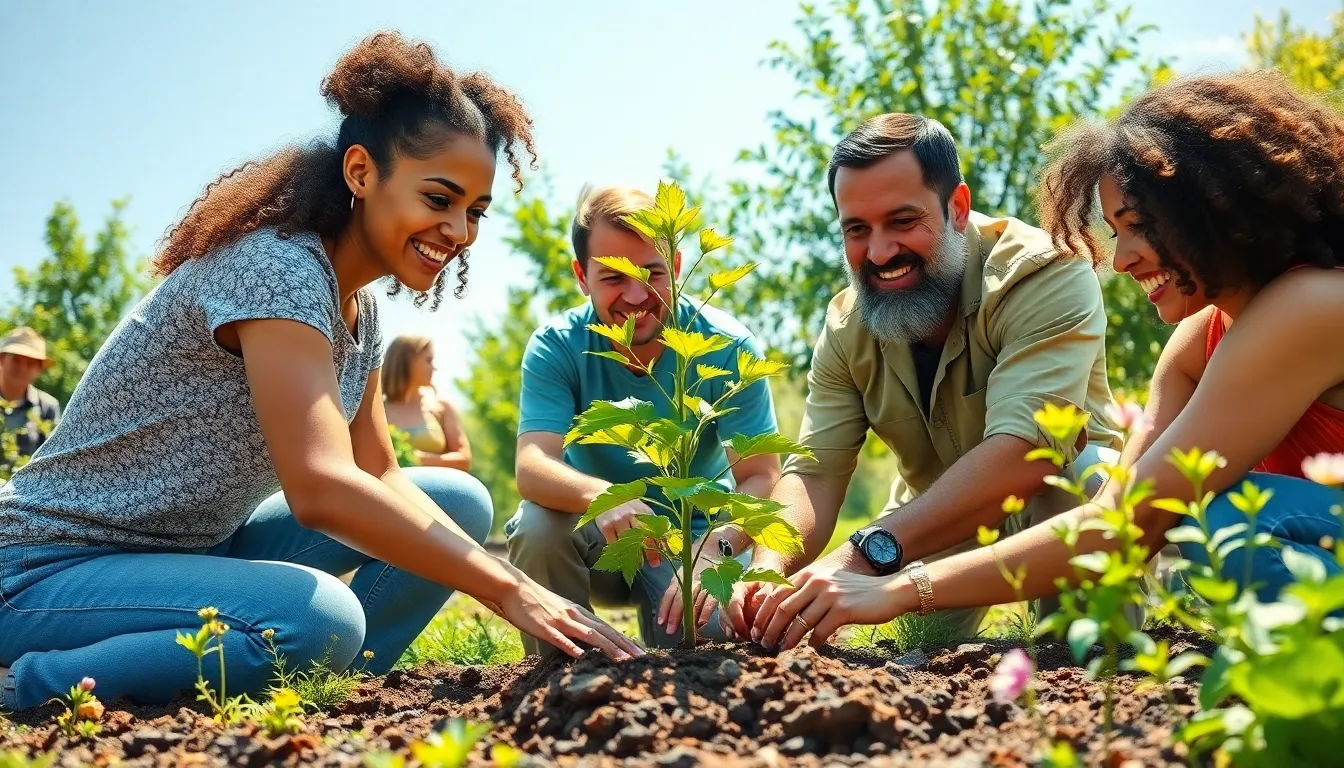Sustainable living isn’t just a trendy buzzword for eco-warriors; it’s a lifestyle choice that packs a punch for both the planet and personal well-being. Imagine a world where your morning coffee doesn’t come with a side of guilt, and your shopping habits don’t contribute to a landfill crisis. By embracing sustainability, individuals can create ripples of positive change that extend far beyond their own front yards.
Table of Contents
ToggleWhat Impact Does Sustainable Living Have
Sustainable living fosters environmental conservation by reducing waste and pollution. It promotes the use of renewable resources, leading to lower carbon emissions. Communities that embrace this lifestyle often witness improved public health through healthier air and water quality.
Economic benefits also arise from sustainable practices. Adopting energy-efficient solutions reduces utility costs for households and businesses. Green jobs in renewable energy sectors create employment opportunities, stimulating local economies.
Socially, sustainable living builds stronger communities. Engagement in local food systems encourages healthier eating habits and fosters relationships among residents. Individuals often experience enhanced well-being from reduced stress associated with environmental degradation.
Educational impacts emerge as well. Awareness of sustainability practices leads to informed choices, empowering individuals to make a difference. Knowledge spreads through community workshops and online resources, enhancing collective understanding of environmental issues.
Behavioral changes manifest through conscious consumerism. People shift purchasing habits toward eco-friendly products, illustrating increased demand for sustainable options. These choices signal to manufacturers the importance of responsible production methods.
Cultural shifts occur when sustainable living becomes shared values among communities. Collaboration in sustainability initiatives strengthens social ties, promoting a sense of belonging. Collectively, individuals work toward common goals, reinforcing the commitment to protecting the planet for future generations.
Environmental Benefits

Sustainable living significantly impacts the environment by reducing pollution and conserving natural resources.
Reduction of Carbon Footprint
Adopting sustainable practices leads to a notable reduction in carbon emissions. Choosing energy-efficient appliances results in lower energy consumption. Opting for public transportation or biking instead of driving decreases reliance on fossil fuels. Using renewable energy sources like solar or wind contributes to a cleaner atmosphere. Each action, whether small or large, adds up to substantial decreases in greenhouse gas emissions over time. Communities that embrace these lifestyle changes foster awareness and inspire others to follow suit, amplifying the positive effects on air quality.
Conservation of Natural Resources
Sustainable living emphasizes the need to conserve vital natural resources. Implementing water-saving techniques, such as rainwater harvesting or low-flow fixtures, reduces water usage. Choosing locally sourced products minimizes the resources required for transportation and supports local economies. Recycling and composting initiatives divert waste from landfills and promote resource recovery. Each of these activities helps maintain biodiversity and protects ecosystems. By conserving resources, individuals contribute to a healthier planet, ensuring future generations can also enjoy these essential elements.
Economic Impact
Sustainable living contributes significantly to economic growth and resilience. This lifestyle choice not only benefits the environment but also offers financial advantages for individuals and communities.
Cost Savings on Utilities
Reducing energy consumption leads to lower utility bills. Implementing energy-efficient technologies, such as LED lighting and programmable thermostats, can save households up to 30% on electricity costs. Water-saving fixtures and practices, like rainwater harvesting, also reduce water bills substantially. These savings empower consumers and allow for reallocating funds toward other essential needs. Lower utility costs stimulate local economies as residents redirect spending.
Job Creation in Green Industries
Transitioning to sustainable practices forms a strong basis for job creation. Green industries, including renewable energy, waste management, and sustainable agriculture, have seen growth rates surpassing traditional sectors. In 2022, the renewable energy sector alone generated over 11 million jobs globally. Locally sourced food systems and eco-friendly products drive demand for skilled labor, further enriching communities. Investing in green jobs enhances economic stability and promotes long-term growth.
Social Implications
Sustainable living extends beyond environmental benefits, fostering important social changes. This lifestyle choice encourages healthier communities and deeper relationships among individuals.
Health Improvements
Healthier eating habits emerge through local food systems, which prioritize fresh, organic produce. Research shows that communities embracing sustainable practices often experience lower rates of obesity and chronic diseases. Improved air quality from reduced emissions contributes significantly to respiratory health. Access to green spaces increases opportunities for physical activities and social interactions. Overall, adopting sustainable living practices creates a foundation for long-term health improvements across populations.
Community Engagement
Sustainable living strengthens community ties and enhances local engagement. Farmers’ markets and community gardens serve as hubs where residents connect over shared values. Educational initiatives raise awareness, empowering individuals to participate in community decision-making. Volunteer opportunities arise as people unite to address local environmental issues, fostering a sense of belonging. Collaborative efforts in sustainability projects build trust and encourage ongoing dialogue among residents, creating a more cohesive community fabric.
Challenges in Sustainable Living
The journey toward sustainable living presents various challenges. Addressing these hurdles is crucial for success.
Accessibility and Affordability
Many individuals encounter significant barriers to adopting sustainable practices due to high costs associated with eco-friendly products. Organic foods and renewable energy installations, for instance, can initially require greater financial investment. In urban settings, people often struggle to find affordable options for public transportation or local markets that prioritize sustainability. Lack of access to resources can stifle growth in sustainable habits, particularly in low-income communities. Finding ways to increase the accessibility and affordability of sustainable choices is essential to promote broader adoption.
Resistance to Change
Resistance to change poses a substantial challenge in the pursuit of sustainable living. Many consumers express hesitance toward new practices, often rooted in a lack of understanding or familiarity. Changing long-standing habits can take time and effort, particularly for those accustomed to convenience-oriented lifestyles. Additionally, misinformation about sustainability may lead to skepticism and reluctance. Effective education and awareness initiatives are vital to overcoming this resistance. Engaging with communities and sharing success stories can inspire individuals to embrace sustainable living more readily.
Sustainable living offers transformative benefits that extend far beyond individual choices. By embracing this lifestyle, people can contribute to a healthier planet while also enhancing their own well-being. The positive ripple effects on communities, economies, and the environment create a more resilient future for all.
As awareness grows and sustainable practices become mainstream, the collective impact can lead to significant cultural shifts. Engaging in eco-friendly habits not only fosters stronger social ties but also empowers individuals to take part in meaningful change. The journey toward sustainability is filled with challenges, but with commitment and education, it’s possible to create a brighter future for generations to come.






